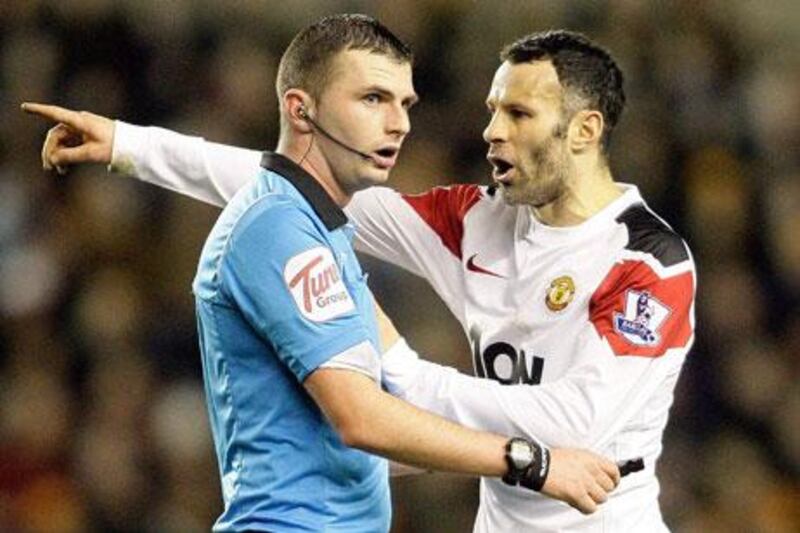It had to happen at some time. That was the consensus as Manchester United extended their unbeaten record. The side dubbed "The Unconvincing Invincibles" by their own supporters were not unstoppable.
If a defeat appeared an inevitability from the comments emanating from Old Trafford and elsewhere alike, the location and the timing of their first loss provided the element of surprise.
Saturday's setback at Molineux meant that Wolverhampton Wanderers, who nevertheless ended the day at the foot of the Premier League, have now claimed the scalps of five of the top seven sides. It also ensured that, for the first time in 10 months and 30 games, United walked away with nothing.
When they are trailing, the mind is trained to expect a bombardment of the opponents' goal, to anticipate another in a long line of comebacks. Only this time there wasn't one.
Even United are not always able to summon escape acts at will. Javier Hernandez does a passing impression of Ole Gunnar Solskjaer, but that does not equate to a guarantee of late goals from the Mexican.
Ryan Giggs and Paul Scholes had provided classy interventions as first Blackpool and then Southampton were overcome when United acquired a relentless momentum, but there wasn't a third fabulous fightback within a fortnight.
In truth, the warning signs were there. Scholes is 36 and Giggs 37. It is unrealistic to expect each to continue inspiring dramatic turnarounds (though, tellingly, the fractious veterans appeared most annoyed by their inability to complete a hat-trick).
Giggs, playing in his eighth successive game, is entitled to wonder why others are less resilient and less reliable. Michael Carrick was out-passed by Nenad Milijas, just as Darron Gibson had suffered in comparison with Charlie Adam at Bloomfield Road 11 days before.
Passing the torch to the next generation is a problematic process. United have conceded only 10 times in the 15 league games Rio Ferdinand has been fit to partner Nemanja Vidic. They have let in 14 goals in the 10 matches when the Serb has been paired with either Chris Smalling or, more often, the unconvincing Jonny Evans.
When Ferdinand was injured in the warm-up at Molineux and the error-prone Evans promoted, it was an invitation to Wolves to probe for frailties.
Both goals derived from set pieces and, as United are not a tall team, it exacerbates the importance of forceful headers of the ball such as Vidic and Ferdinand.
It was instructive, too, that Wolves had completed more passes in the first half. This was no smash-and-grab raid.
Indeed, it appeared an admission of weakness that Sir Alex Ferguson had configured his side to match first Blackpool and then Southampton before, on each occasion, reverting to something more recognisable to salvage victory. It suggests United have been worrying about the opposition rather more than was their wont in the past.
That is understandable. Wayne Rooney and Dimitar Berbatov have been enigmatic presences this season, even though the latter is the division's top scorer. United have been at their buccaneering best at times (notably, and recently, a week ago against Aston Villa) but such games have been the exceptions, not the rule. While the Bulgarian's has been a season of boom and bust, there has been a consistency to results.
More often than not, matches have not been tales of United dominance. There have been examples of their powers of recovery and never-say-die spirit, spells of defensive resilience and efficient organisation and plenty of proof of the know-how needed to win, or avoid losing, a game.
So it is an achievement that they enter the final third of the season with a four-point lead. In more ways than one, they remain the team to beat.
Roberto Di Matteo's sacking by West Bromwich Albion is the latest of many reminders how quickly fortunes change in football.
Fourth in October, they are fourth from bottom now. A run of 13 defeats in 18 games and an inability to keep clean sheets accounted for the elegant Italian but, with home games against West Ham United and Wolves next, the timing is still strange.
In the three previous Premier League seasons where Albion kept faith with a manager, they were relegated; in the one (2004/05, when Bryan Robson replaced Gary Megson) where they didn't, they stayed up. But that is no guarantee of a repeat this time around.
The Premier League's superlative Saturday brought a record 41 goals and a blur of unlikely statistics.
Wigan Athletic, the lowest scorers in the country, struck four times; Louis Saha, with a mere two league goals to his name all season, mustered a quartet of his own; Newcastle United became the first team in the division's history to claim a point after being 4-0 down; and John Pantsil, the Fulham full-back, scored his third own goal of the season.
And yet among all the goals, it may seem perverse to focus on one that did not go in, but the goal-line clearance executed by Blackpool's Ian Evatt to deny Everton's Jack Rodwell was little short of amazing.
Nevertheless, it was a day to suggest that, for all the January expenditure on strikers, some managers might have been better off purchasing a centre-back or two.






